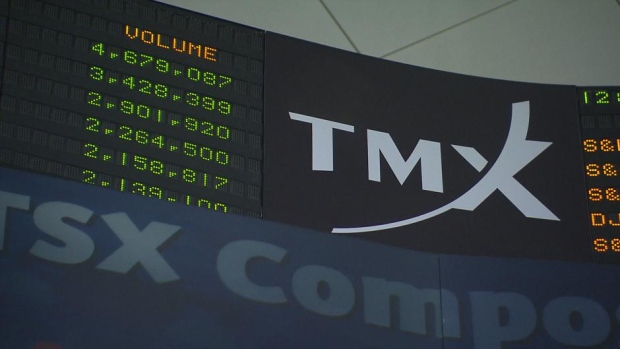Jun 7, 2017
TSX falls as oil price dip puts pressure on energy shares
, Reuters

Canada's main stock index fell on Wednesday as a sharp drop in oil prices put pressure on energy shares, which slumped to an 11-month low, while investors weighed political uncertainty ahead of key events on Thursday.
U.S. crude prices fell more than five per cent to US$45.75 a barrel after the U.S. government reported an unexpected increase in inventories of crude and gasoline.
"It sheds light on the challenge that the oil markets are facing. OPEC can cut, but it is having very little impact on the overall price as the U.S. is offsetting production cuts out of the Middle East with production increases of its own," Philip Petursson, chief investment strategist at Manulife, said in a telephone interview.
Some of the biggest weights on the index were Canadian Natural Resources Ltd (CNQ.TO), which fell 2.7 per cent to $38.54 and Suncor Energy Inc (SU.TO), which was down 2.6 per cent at $41.14.
The overall energy group slumped to its lowest since June 27, down 3.4 per cent.
The materials group, which includes precious and base metals miners and fertilizer companies, lost 0.5 per cent.
Gold prices fell from near seven-month highs on a stronger dollar and after prepared testimony by former FBI Director James Comey — released on Wednesday in advance of his Thursday appearance before a U.S. Senate committee — was seen as containing few surprises. But declines were limited as uncertainty from Thursday's election in Britain remained.
If stocks decline on Comey's testimony on Thursday, there could be a buying opportunity, Petursson said.
"When we look ahead into Q2 and Q3 earnings growth, they look very robust," he added.
Telecommunication shares lost 1.4 per cent. Still, the group has rallied more than 13 per cent since mid-November.
The Toronto Stock Exchange's S&P/TSX composite index closed down 92.42 points, or 0.6 per cent, at 15,372.14. Eight of the index's 10 main groups ended lower.
The financial services group was one of only two of the index's 10 main groups to end higher. It rose 0.3 per cent, helped by a 3.6 per cent gain for Sun Life Financial Inc (SLF.TO) to $45.42 after RBC raised its rating on the stock to outperform from sector perform.
Dollarama Inc (DOL.TO) reported a better-than-expected profit for the eighth straight quarter, as customers on average spent more at its stores, sending shares to an all-time high. Its shares rose 0.8 per cent to $129.02.
U.S. MARKETS
U.S. stocks rose on Wednesday despite a sharp decline in energy shares after written testimony from former FBI director James Comey did not add major revelations about an investigation into Russian meddling with last year's U.S. presidential election.
Comey, who was fired by Trump last month, wrote that U.S. President Donald Trump asked him to drop an investigation of former national security adviser Michael Flynn.
But the details of Comey's testimony, expected to be delivered Thursday to a Senate Committee, appeared to be priced into the stock market.
Investors were concerned that any additional revelation could dampen already flagging momentum for Trump's agenda of lower taxes and lax regulations.
Bets that Trump can implement his agenda are partly behind a rally that has taken stock indexes to record highs.
"They were hoping that there wasnRt going to be anything in there that was more inflammatory," said Peter Costa, president of trading firm Empire Executions.
"The testimony wasn't as disastrous as it could have been," he said of the prepared remarks, adding that the market was relieved no damaging details emerged and his testimony "more than likely isn't going to blow up into some big fiasco, another thing that the president has to deal with."
Costa cautioned that the market's reaction to Comey's remarks was not a particularly big move up and volume was light.
The Dow Jones Industrial Average rose 37.46 points, or 0.18 per cent, to 21,173.69, the S&P 500 gained 3.81 points, or 0.16 per cent, to 2,433.14 and the Nasdaq Composite added 22.32 points, or 0.36 per cent, to 6,297.38.
Wall Street was weighed by a near two-per-cent drop in the S&P 500's energy sector. All but two of the 34 components of the sector fell as U.S. crude futures tumbled five per cent due to an unexpected rise in U.S. inventories. Brent crude fell nearly four per cent.
The largest percentage gainer on the S&P 500 was Signet Jewelers, which rose four per cent, while the largest decliner was Newfield Exploration, down seven per cent.
Investors are also keeping an eye on Britain's general election and the European Central Bank's policy meeting, both on Thursday.
Opinion polls have shown Conservative Prime Minister Theresa May's lead over the opposition Labor party narrow over the last three weeks, with some even suggesting she could fall short of a majority government. The election comes as Britain maps its exit from the European Union following a referendum on the subject last year.
The ECB is expected to reiterate its plan to maintain a very accommodative monetary policy at least until the end of the year.
Declining issues outnumbered advancing ones on the NYSE by a 1.12-to-1 ratio; on Nasdaq, a 1.13-to-1 ratio favored advancers.
Volume on U.S. exchanges was 6.60 billion shares, roughly in line with the average over the last 20 trading days.





